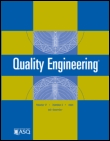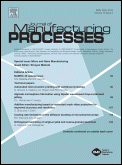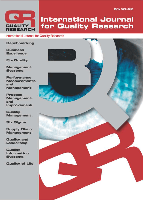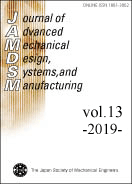
Quality Engineering
Scope & Guideline
Championing the future of quality in engineering practices.
Introduction
Aims and Scopes
- Statistical Process Control (SPC) and Quality Control Techniques:
Research emphasizing the development and optimization of statistical methods for monitoring and controlling manufacturing processes to ensure product quality. - Reliability Engineering and Maintenance Optimization:
Studies that explore methodologies for predicting and enhancing the reliability of systems, including maintenance strategies and failure analysis. - Experimental Design and Analysis:
Innovative approaches to experimental design, including response surface methodology and design of experiments (DOE), aimed at optimizing processes and product quality. - Machine Learning and Artificial Intelligence Applications:
Application of advanced computational techniques, such as deep learning and reinforcement learning, to enhance quality control and process optimization in manufacturing. - Quality 4.0 and Industry 4.0 Integration:
Exploration of the intersection between quality management and modern industrial technologies, including digital twins and smart manufacturing. - Risk Assessment and Decision-Making in Quality Engineering:
Research focused on methodologies for assessing risks and making informed decisions in quality engineering contexts, often incorporating uncertainty and variability.
Trending and Emerging
- Integration of AI and Machine Learning in Quality Engineering:
There is a growing trend towards utilizing artificial intelligence and machine learning techniques for predictive maintenance, quality monitoring, and process optimization, indicating a significant shift in methodological approaches. - Quality 4.0 and Digital Transformation:
Research focusing on Quality 4.0 encompasses the integration of digital technologies in quality management, reflecting the industry's movement towards smart manufacturing and the Internet of Things (IoT). - Sustainability and Environmental Quality Management:
Emerging themes include the incorporation of sustainability considerations into quality engineering practices, highlighting the importance of environmental impacts in production processes. - Advanced Statistical Methods and Big Data Analytics:
The trend towards utilizing big data analytics and advanced statistical methodologies for quality improvement reflects the industry's need to manage and analyze large volumes of data effectively. - Uncertainty Quantification and Risk Management:
An increasing focus on uncertainty quantification in engineering processes and risk management practices is evident, as industries seek to better understand and mitigate risks associated with quality.
Declining or Waning
- Traditional Six Sigma Methodologies:
While Six Sigma remains a foundational concept in quality management, its prominence in recent literature has diminished, potentially overshadowed by newer methodologies such as Quality 4.0. - Basic Control Chart Techniques:
Basic statistical process control techniques are becoming less common as more advanced and complex methods are developed, indicating a shift towards innovative monitoring approaches. - Conventional Reliability Testing Methods:
There is a noticeable decline in studies focusing solely on traditional reliability testing methods, as researchers are increasingly integrating predictive analytics and machine learning into reliability assessments. - Standard Quality Auditing Practices:
The frequency of studies solely dedicated to conventional auditing practices has decreased, possibly due to a shift towards more integrated and automated quality management systems.
Similar Journals

Advances in Manufacturing
Redefining Manufacturing Through Rigorous ResearchAdvances in Manufacturing, published by Springer, is a premier journal dedicated to the evolving fields of Industrial and Manufacturing Engineering, Mechanical Engineering, Mechanics of Materials, and Polymers and Plastics. With an impact factor placing it in the Q1 category across multiple disciplines for the year 2023, this journal serves as a vital platform for disseminating cutting-edge research and insights that drive innovation in manufacturing practices. The journal is renowned for its rigorous peer-review process, ensuring that only high-quality studies contribute to the body of knowledge. Spanning the years from 2013 to 2024, it not only publishes papers that advance theoretical frameworks but also those that explore practical applications and case studies in the manufacturing sector. Researchers, industry professionals, and students will find invaluable resources within its pages, fostering collaboration and knowledge exchange within the manufacturing community. This journal is based in the United States, located at One New York Plaza, Suite 4600, New York, NY 10004, and is accessible through various institutional subscriptions.

Journal of Manufacturing Processes
Transforming Ideas into Manufacturing SolutionsThe Journal of Manufacturing Processes, published by Elsevier Science Ltd, serves as a premier platform for researchers, professionals, and students engaged in the fields of Industrial and Manufacturing Engineering as well as Management Science and Operations Research. With an impressive Q1 ranking across multiple categories for 2023, this journal not only showcases innovative research but also provides insights into strategic management and operational excellence within the manufacturing sector. Covering an extensive timeline from 1999 to 2024, the journal has solidified its position within the academic community, consistently ranking in the top percentile across various Scopus categories. Although it does not offer open access, the journal maintains a commitment to disseminating high-quality, peer-reviewed research that drives advancements in manufacturing processes. Located in the Netherlands, the journal aims to foster collaboration and knowledge sharing among scholars and industry experts alike, making it an indispensable resource for anyone dedicated to the advancement of manufacturing science.

International Journal of System Assurance Engineering and Management
Advancing Safety and Reliability Through Innovative ResearchThe International Journal of System Assurance Engineering and Management, endorsed by SPRINGER INDIA, stands as a pivotal platform in the field of Safety, Risk, Reliability, Quality, Strategy, and Management. Established in 2010, this peer-reviewed journal offers a rich repository of innovative research and practical insights that address contemporary challenges in system assurance across various sectors. With a commendable Q2 category ranking in both Safety, Risk, Reliability, and Quality, as well as in Strategy and Management for 2023, the journal is recognized for its rigorous standards and significant contribution to the academic community. Although it operates under a subscription model, the journal ensures wide dissemination of critical findings to its readership, which includes researchers, industry professionals, and students. With its Scopus rankings affirming its impact—ranked #71/207 in Safety, Risk, Reliability and Quality, and #198/478 in Strategy and Management—the journal is a must-read for those seeking to enhance their knowledge and application of engineering and management principles in real-world settings.

International Journal of Interactive Design and Manufacturing - IJIDeM
Unleashing Potential through Innovative Manufacturing PracticesInternational Journal of Interactive Design and Manufacturing (IJIDeM), an esteemed publication by SPRINGER HEIDELBERG, has carved a niche in the domains of Industrial and Manufacturing Engineering and Modeling and Simulation. Established in 2008, this journal serves as a critical platform for disseminating cutting-edge research and practical advancements related to interactive design and innovative manufacturing processes. With an impact factor that places it within the Q2 and Q3 quartiles of respective categories, and Scopus rankings affirming its relevance, IJIDeM invites contributions that explore the crossroads of design, technology, and engineering. Researchers, professionals, and students alike will find valuable insights and collaborations through its pages, making it a vital resource for anyone seeking to enhance their understanding of interactive design principles in manufacturing contexts.

International Journal for Quality Research
Championing Quality in Engineering and Management Disciplines.International Journal for Quality Research (ISSN: 1800-6450; E-ISSN: 1800-7473) is a prestigious peer-reviewed journal published by the Faculty of Engineering, University of Kragujevac, Serbia. Since its inception in 2007 as an Open Access platform, it has continually aimed to disseminate high-quality research in the fields of Industrial and Manufacturing Engineering, Management Science and Operations Research, and Safety, Risk, Reliability and Quality. With a notable impact factor reflected in its quartile rankings—Q2 in Industrial and Manufacturing Engineering and Q3 in both Management Science and Safety—this journal serves as a vital resource for scholars and practitioners seeking to advance their knowledge and contribute to ongoing dialogues in quality research. The journal boasts impressive Scopus rankings, positioning it favorably among its peers, and continues to attract diverse contributions that foster innovation and best practices in quality management. The converged years of publication from 2012 to 2024 indicate a sustained commitment to addressing the evolving challenges and opportunities within its domains, making it an essential reading for any serious researcher or professional in the field.

Production Engineering Archives
Pioneering Research for a Sustainable Industrial FutureProduction Engineering Archives, published by WALTER DE GRUYTER GMBH, stands as a premier open access journal dedicated to the fields of industrial and manufacturing engineering, management information systems, and the management of technology and innovation. Since its inception in 2013, this journal has committed itself to disseminating high-quality research that drives forward the discourse in these crucial areas. With a commendable impact reflected in its 2023 Category Quartiles, which place it in Q2 for multiple categories including Industrial and Manufacturing Engineering and Management Information Systems, the journal holds esteemed ranks in the Scopus index, highlighting its significance in the academic community. By facilitating unrestricted access to cutting-edge research from Poland and beyond, the Production Engineering Archives plays a pivotal role in enhancing knowledge and fostering innovation among researchers, professionals, and students alike.

International Journal of Quality & Reliability Management
Pioneering Research for Organizational SuccessInternational Journal of Quality & Reliability Management is a leading academic journal devoted to the exploration of quality management and reliability engineering within organizational contexts. Published by EMERALD GROUP PUBLISHING LTD, this journal has been a pivotal resource since its inception in 1970, with a scope that encompasses interdisciplinary approaches to improve quality and reliability across various sectors. Operating from the United Kingdom, it ranks in the Q2 category for both Business, Management, and Accounting, and Strategy and Management, signifying its esteemed reputation and contribution to the field. With an impressive standing in Scopus, the journal ranks 61 out of 218 in general business, and 153 out of 478 in strategy and management. Although it does not currently offer open access options, its rich content is indispensable for researchers, professionals, and students focused on developing strategic quality initiatives and enhancing operational reliability. With a comprehensive convergence of scholarly articles and case studies, the International Journal of Quality & Reliability Management remains an essential venue for advancing knowledge and practice in quality management and reliability disciplines.

Journal of Advanced Mechanical Design Systems and Manufacturing
Transforming Ideas into Advanced Engineering Solutions.The Journal of Advanced Mechanical Design Systems and Manufacturing, published by the Japan Society of Mechanical Engineers, is a pivotal scholarly platform dedicated to advancing knowledge in the fields of Industrial and Manufacturing Engineering and Mechanical Engineering. As an Open Access journal since 2021, it provides unrestricted access to high-quality research, facilitating broader dissemination and collaboration among researchers, professionals, and students globally. The journal's emphasis on innovative methodologies and cutting-edge technologies contributes significantly to the evolving landscape of engineering practices, with its research scope encompassing the latest advancements and applications in mechanical design and manufacturing systems. With a current impact factor that positions it in the Q3 quartile of both the Industrial and Manufacturing Engineering and Mechanical Engineering categories, along with its Scopus rankings further indicating its relevance in the field, this journal is an essential resource for those seeking to push the boundaries of mechanical engineering knowledge. For further inquiries or submissions, please reach the journal at its headquarters located at KDX Iidabashi Square Bldg, 2nd Floor, 4-1 Shin-ogawamachi, Shinjuku-ku, Tokyo, Japan.

Advances in Industrial and Manufacturing Engineering
Pioneering breakthroughs in engineering innovation.Advances in Industrial and Manufacturing Engineering is a leading academic journal published by Elsevier, dedicated to the dissemination of cutting-edge research in the fields of industrial and manufacturing engineering, mechanical engineering, and the mechanics of materials. Since its inception as an Open Access journal in 2020, it has fostered a global community of scholars committed to advancing theoretical and practical applications in these dynamic areas. With a prestigious Q1 ranking in multiple engineering disciplines and impressive Scopus standings, the journal provides a platform for innovative research that bridges the gap between theory and practice. Based in the Netherlands, the journal encourages the submission of high-quality papers that explore the latest advancements and challenges in the engineering sector. Its open access model ensures that research contributions reach a broad audience, making a significant impact in academia and industry alike. As it converges from 2020 to 2024, the journal aspires to continue setting the benchmark for excellence in engineering research.

TEHNICKI GLASNIK-TECHNICAL JOURNAL
Advancing Innovation in Engineering and TechnologyTEHNICKI GLASNIK-TECHNICAL JOURNAL is a peer-reviewed, open-access journal published by UNIV NORTH in Croatia, dedicated to fostering knowledge and innovation in the fields of engineering, computer science applications, and information systems. With an ISSN of 1846-6168 and an E-ISSN of 1848-5588, this journal has been a vital resource for researchers since its transition to open access in 2009, ensuring that valuable insights are freely available to the global academic community. Notably, it has achieved a commendable presence in various Scopus categories, including ranking in the 34th percentile for general engineering and engaging with emerging trends in areas like computer graphics and management information systems. As of 2023, it holds quartile rankings ranging from Q3 in engineering to Q4 in several computer science categories, underlining its diverse scope and relevance. The journal aims to provide a platform for rigorous research, innovative methodologies, and practical applications, making it essential reading for academics, practitioners, and students interested in advancing their understanding and practice in technical disciplines.